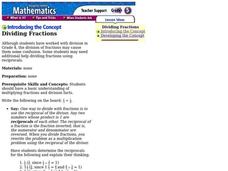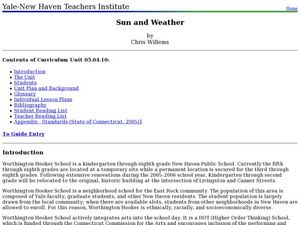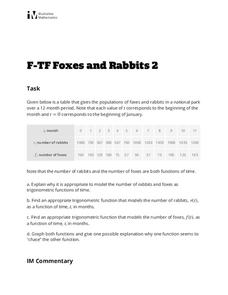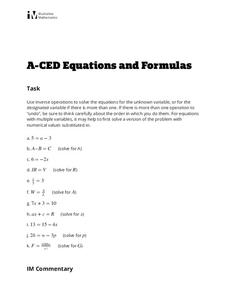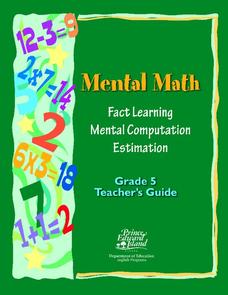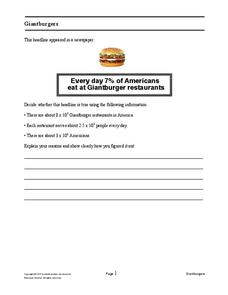EngageNY
An Exercise in Creating a Scale Drawing
Design your dream classroom. The lesson plan contains an exercise to have teams create a scale drawing of their dream classroom. Pairs take the measurements of their classroom and furniture and create a scale factor for them. To finish...
National Institute of Open Schooling
Adsorption and Catalysis
Adsorption, not absorption, is when atoms stick to the surface of an object, like water sticking to a grain of sand. An informative lesson delves into adsorption, teaching physical and chemisorption and the factors that affect them....
EngageNY
Mixture Problems
What percent of the mixture is juice? Pairs use their knowledge of proportions to determine what percent a mixture is juice given the percent of juice in the components. Pupils use the procedure learned with the juice mixture problem to...
Curated OER
To the North: A Black Family Leaves Arkansas to Find Work in Michigan
Upper elementary and middle school scholars study the economic factors that caused so many Arkansans to migrate to different parts of the country looking for work. Use this history lesson plan to help your charges gain a better...
Texas Instruments
Changing Functions
Your algebra 2 learners show what they can do in this assessment activity on shifting, reflecting, and stretching graphs. Given the graphs of various functions, they write the represented equation.
Curated OER
Dividing Fractions
Reciprocals are the method used for dividing fractions in this instructional session. A fraction is defined as being a division problem, and then the whole group works together to solve several problems. They check for the reasonableness...
Curated OER
Sun and Weather
How is the Earth's weather created? Middle schoolers will explain how the Sun's energy is transformed into different forms. They will perform mathematical calculations of volume, mass, and temperature. They they will explain the...
Curated OER
Foxes and Rabbits 2
Explore the relationship between the population of foxes and rabbits in a national park using trigonometric models. Plot data and find the appropriate trigonometric functions. Two questions require interpretation and explanation of...
Illustrative Mathematics
Points equidistant from two points in the plane
Young geometers apply their deductive reasoning skills and knowledge of proving triangles congruent in a task that asks them to prove if a point lies on the perpendicular bisector of a segment, then it is equidistant from the endpoints...
Illustrative Mathematics
DVD Profits, Variation 1
The idea in the resource is to understand the connections between proportional relationships, lines, and linear equations. To stay within the context of the standard, skip the part of the resource that solves with unit rates. Instead,...
Illustrative Mathematics
Equations and Formulas
Your class is asked to use inverse operations to solve eleven equations for unknown variables or to rearrange formulas to highlight a quantity of interest. By using the same reasoning as solving one- and two-step equations, algebra...
Penn Museum
Penn Museum: China Gallery
Invite your learners to take a closer look at the art and mathematical function of dome buildings as designed by the ancient Romans. In the next segment of this attractive worksheet set, your young historians will then learn about...
Illustrative Mathematics
Field Day Scarcity
Introduce young mathematicians to concepts of financial literacy with this open-ended word problem. With seven dollars to spend during field day and given a list of available items and their prices, children must determine how they want...
Prince Edward Island
Fact Learning, Mental Computation, Estimation
Need help with mental math in your classroom? This guide is full of tips, tricks, and examples to help the teacher encourage learners to use their brain instead of a calculator. Practice problems are included with reasons how...
Mathematics Assessment Project
Giantburgers
Americans love burgers! Pupils determine whether a given claim about burgers is true by reasoning from the provided information. The task involves operations with scientific notation.
Mathematics Assessment Project
Arithmetic with Polynomials and Rational Expressions
It all starts with arithmetic. An educational resource provides four items to use in summative assessments. The items reflect the basic skill level required by the standards in the domain and are designed to have...
Mathematics Assessment Project
Creating Equations
Using equations to model events. The resource contains four items that prompt individuals to write and solve basic equations. They must reason abstractly and quantitatively while attending to precision when solving the problems.
Bowland
Magic Sum Puzzle
Learners discover the magic in mathematics as they solve numerical puzzles involving magic sums. They then make a conjecture as to why no additional examples are possible based on an analysis of the puzzles.
Balanced Assessment
Rolling Coins
What caused the extra rotation? Class members visualize a coin rolling around the circumference of another coin. They determine the reason the rolling coin rotates twice. Further questions require them to determine a generalized formula...
Balanced Assessment
Fermi Estimates I
Enrico Fermi, the physicist responsible for the first nuclear detonation, was known for his ability to estimate with little or no data. Use this task to have your classes practice their Fermi skills. They estimate the magnitude of three...
Illustrative Mathematics
Daisies in Vases
Have your first graders master word problems with an activity that prompts them to find as many combinations for daisies in vases, with the most in the large vase and the least in the small vase. Pupils must also explain their...
National Nanotechnology Infrastructure Network
The Micro and Macro World Around Us
Don't let your eyes play tricks on you ... use scale to keep your eyes in check! Young scholars observe images without scale and try to identify the structure. Then, they look at the same image with a scale bar and assess whether their...
101 Questions
Money Duck
A video presentation shows duck-shaped soap that has a $1, $5, $10, $20, or $50 bill in its center. Learners consider different population distribution of the bills to determine a reasonable price for the duck.
Concord Consortium
Zero Coupon Bond
There are zero reasons not to learn about zero coupon bonds. Given information about the interest rate and closing price of a zero coupon bond, future investors determine the purchase price of the bond. They then consider the...
Other popular searches
- Mathematical Reasoning 12
- Mathematical Reasoning Grid
- Mathematical Reasoning Shapes
- Mathematical Reasoning 1.2







